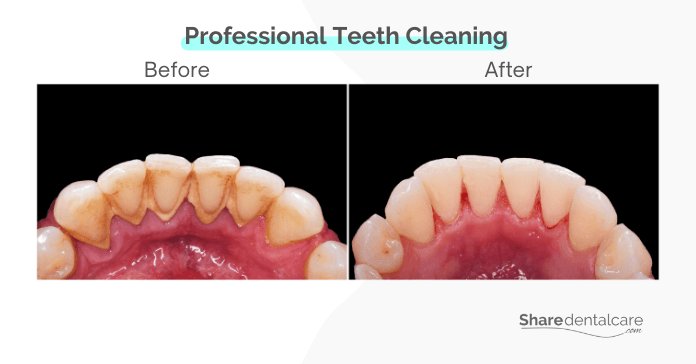Dental plaque is a sticky, colorless film of bacteria that constantly builds up on your teeth. If plaque is not removed regularly with brushing and flossing, it will harden and become tartar. Tartar is a hard, yellowish deposit that forms on the surface of your teeth. Both plaque and tartar can cause tooth decay and gum disease. Unfortunately, tartar is much harder than plaque and cannot be removed with brushing or flossing. Some people may experience tartar breaking off their teeth. In this blog post, we’ll discuss the causes of tartar breaking off teeth and what you should do.
What Causes Tartar Buildup?
Tartar and plaque buildup are usually caused by poor oral hygiene. Several factors may increase your risk of tartar buildup, such as:
- Not brushing or flossing regularly.
- Smoking and tobacco use.
- Dry mouth.
- Eating sugary or starchy foods.
- Some medications reduce saliva production.
Causes of Tartar Breaking Off Teeth
Tartar is hard and difficult to remove at home. However, some people may experience tartar breaking off their teeth. This can happen due to several reasons, such as:
- Aggressive brushing
- Chewing hard foods
- Biting on hard objects
- Bruxism (teeth grinding)
- Trauma
- Tartar can also break off spontaneously if it becomes weak and crumbly
What Happens When Tartar Breaking off Teeth?
Tartar breaking off teeth, causing:
- An uncomfortable feeling when the tongue rubs against the broken tartar.
- Tongue irritation and sores due to the sharp edges of broken tartar.
- Tooth sensitivity. If you have gum recession as a result of gum disease, the broken tartar can expose the sensitive root surfaces of your teeth.
How To Distinguish Between Tartar Breaking Off Teeth & a Chipped Tooth?
Tartar that breaks off can sometimes be mistaken for a chipped tooth. Healthy tooth enamel is very hard and usually not prone to breakage during normal daily activities. Here’s how to tell the difference between tartar breaking off teeth and a chipped tooth:
- Tartar breaks off into small, jagged pieces with sharp edges.
- The tooth chipping will affect the tooth shape, structure, and size, while tartar breaking off will not.
- Tartar is yellow, brown, or black in color, while chipped teeth appear the same color as healthy enamel.
- Tartar breaks under light pressure, while chipped teeth do not.
How To Deal With Tartar Breaking Off Teeth?
It is unhealthy to have tartar on your teeth, so it should be removed. Tartar can cause complications if left untreated, such as tooth decay and gum disease. Also, tartar can cause infection of the tissues supporting your teeth, leading to gum recession, periodontal pockets, and even tooth loss.
Therefore, you should visit your dentist to remove tartar from your teeth, whether it is breaking off or not. The treatment depends on how severe the tartar build-up is, including:
- Professional teeth cleaning (regular cleaning): This procedure involves removing visible tartar from the teeth using specialized tools. Regular cleaning is performed every six months, and it is the best way to prevent tartar build-up from becoming a problem.
- Scaling and root planing (deep cleaning): This procedure is performed when there is severe tartar build-up that has caused gum disease. It involves removing tartar from below the gum line and smoothing out rough areas on the roots of your teeth to prevent plaque and tartar accumulation.
- Gum flap surgery: It is recommended in cases of advanced gum disease and severe tartar build-up. Flap surgery is a more invasive procedure that involves cutting and folding back the gum tissue to perform a more effective scaling and root planing (deep cleaning).
Additionally, your dentist will treat any existing conditions caused by tartar, such as cavities and gum disease.

How To Prevent Tartar Buildup?
Your best defense against tartar buildup is good oral hygiene habits. Here are some tips:
- Brush your teeth twice a day with a soft toothbrush, fluoride toothpaste, and proper brushing technique for two minutes.
- Floss daily to remove plaque and food particles between the teeth and gums.
- Use an antiseptic mouthwash to reduce plaque and bacteria.
- Visit the dentist for regular checkups and professional teeth cleaning to remove tartar that can’t be reached with brushing and flossing.
- Limit sugary and starchy foods that encourage bacteria growth in the mouth.
- Don’t smoke or use tobacco products, as they increase your risk of plaque buildup and oral health problems.
Conclusion
Tartar breaking off teeth can cause an unpleasant experience, such as tongue sores and tooth sensitivity. If tartar buildup is not removed regularly, it can lead to complications, such as cavities and gum disease. You should visit your dentist to remove tartar buildup, whether it is breaking off or not.
The treatment depends on the severity and extent of tartar buildup, including professional cleaning, scaling, and root planing, or flap surgery.
Practicing good oral hygiene habits and visiting the dentist regularly are important steps to prevent tartar buildup and maintain healthy teeth and gums.